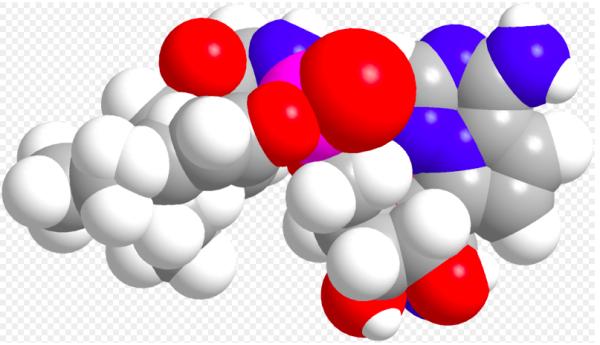Remember back in the early days of COVID when we knew little about the disease and had nothing to treat it with? Remdesivir (brand name Veklury®) seemed promising for a while, but as I wrote last year:
- Its effect was modest, at best.
- It's an IV solution, not a pill, which would be quite an advantage
- It's a bitch to make.
But, just like molnupiravir (aka EIDD-2801), which has made it as far as Phase 3 trials, remdesivir is a direct-acting antiviral drug. And if you want to beat up a virus, this is the way to go (1).
I'm willing to stipulate that [remdesivir] is a useful drug (although, sadly, not the "game changer" that everyone has been looking for).
Derek Lowe in Science Translational Medicine, September 2020
I fully agreed with Derek. Remdesivir, as a direct-acting antiviral drug, did have something going for it, just not much and I had basically written it off. So, it was quite a surprise when Gilead just reported positive results from a Phase 3 randomized, double-blind, placebo-controlled trial. Here is a summary of the trial:
- Gilead evaluated 562 participants, half of whom were given placebo and the other half remdesivir over a three-day period in a non-hospital setting.
- The primary endpoints were COVID-related hospitalization or death (from any cause) 28 days after the trial.
- By the end of the trial, 2/279 (0.7%) in the remdisivir arm had been hospitalized vs. 15/283 (5.3%) in the placebo group – an 87% reduction.
- A secondary endpoint – COVID-related medical visits – also showed efficacy of the drug. In the treated arm 4/246 (1.6%) sought medical care compared to 21/252 (8.3%) in the placebo arm – an 81% reduction.
- No one in either arm died during the trial.
- No new side effects were noted.
I must say that I'm rather surprised. Remdesivir appeared to be "Tamiflu-like" (2) a year ago, knocking a few days off hospital stays and nothing more. I'm not sure why things are so different now, but perhaps this will be answered soon. Gilead will present data at the ID Week 2021 Conference, and is in the process of submitting documents to the FDA.
I wasn't a big remdesivir fan, but even with three shots under my belt, I know that I can still get pretty sick (although far less than before I was vaccinated). It is comforting to know that a three-day IV treatment can reduce hospitalization this effectively.
Antiviral medications provide maximal benefit when used early in the disease course. Last summer, data from clinical trials demonstrated the benefit of remdesivir in patients hospitalized with COVID-19, even when not yet requiring oxygen. These latest data show remdesivir’s potential to help high-risk patients recover before they get sicker and stay out of the hospital altogether.
Robert L. Gottlieb, MD, PhD, Cardiologist and Principal Investigator at Baylor University Medical Center and Baylor Scott & White Research Institute.
NOTES:
(1) Antibodies and steroids are useful in treating COVID, however, they treat the damage caused by an overreactive immune system, not by limiting viral replication.
(2) Tamiflu is a decidedly imperfect flu drug. It must be taken early in the infection and reduces symptoms by a measly one day. I wrote about its unpopularity in 2019. See "4 Prescription Drugs People Hate."




